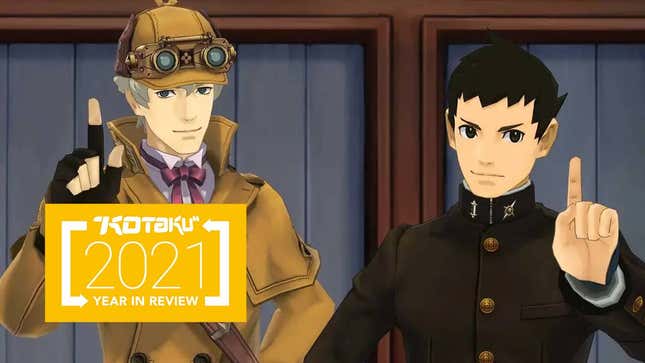
I’m not an accommodating video game critic. A game either sinks its hooks into me within the first hour, or I immediately bounce to something else. I’ve never had any patience for this “it gets good after ten hours” nonsense. A game either understands its own brilliance, or it doesn’t. And only titles that fearlessly believed in their own vision had what it takes to earn a spot on my first annual personal top ten list.
The House in Fata Morgana
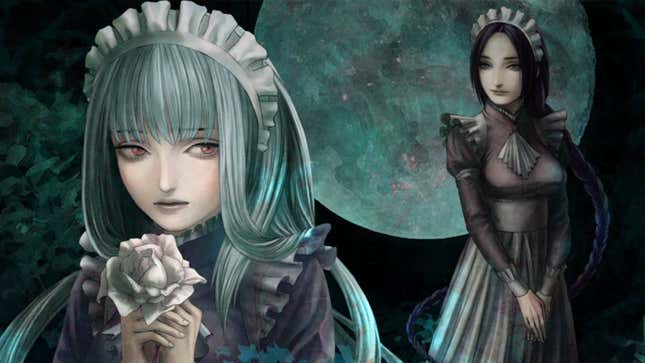
Fata Morgana is the most creatively audacious visual novel that I’ve ever played. Usually, I’m not a huge fan of media that utilizes violence for shock value. I find them bland and creatively lazy. This game is neither of those things. Fata Morgana inflicts crushing amounts of unearned tragedy on its incredibly likeable characters. Just when I thought that the worst of it was over, the situation would worsen to unbearable heights. While I was playing, I just wanted a nicer explanation for everything that happened. That’s how stories were supposed to work, I thought: you get past the gritty bits to be rewarded with crumbs of hope. I kept waiting and wishing until it was clear that I would remain disappointed. Despite that, I kept playing. After a while, I was fully prepared for the game to bring its worst. After watching several tragedies unfold, I was no longer dependent on being rewarded by the narrator. And that changed everything about how I consume stories. Fata Morgana is one of those games that forced me to reckon with my own role as a reader.
Don’t read the spoilers. Just play the game.
The Legend of Tianding
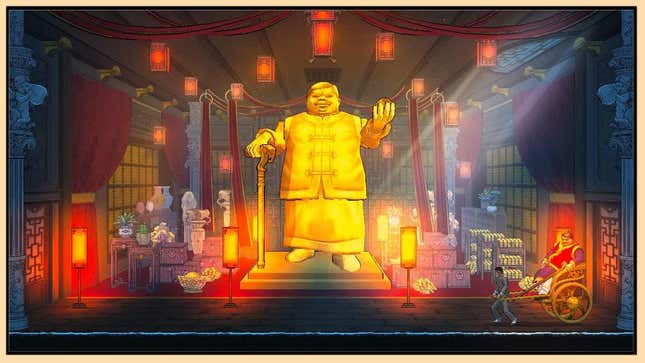
This comic-style platformer gave me what I really needed during a year when our government was constantly failing us: a lovable vigilante who believes in old-school justice. I wrote a lot of words about the cultural context and why Tianding is important as an art game, but really? It’s just fun to steal from the rich and lay the kung fu on some cops along the way.
Octopath Traveler

While Octopath has an immensely fun turn-based combat system, this game earned a spot here mainly because I can’t stop listening to its gorgeous soundtrack. It’s soothing, intensely haunting, and kept me sane while I was trying to buy groceries during a global pandemic. I really couldn’t imagine making it through this year without Octopath.
Tales of Arise
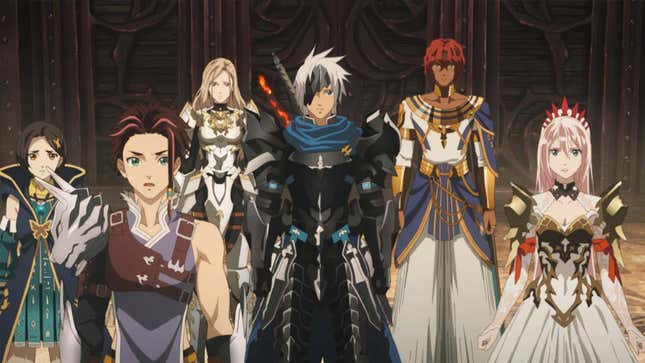
When I booted up Tales of Arise, I was expecting a Tales game but with more budget. It’s absolutely that. But it’s also a surprisingly ambitious story about revolution, empire, and shared struggle. More importantly, it just feels really damn cool to be slamming down finishing moves with my favorite party members. I’ll be grinding in this game well into 2022.
NEO: The World Ends With You

I know, I know. I wrote a harsh review of it earlier in the year because I wanted NEO to be just like its predecessor. I wanted it to eviscerate me and lay my heart bare. I resisted the notion that the game should just be allowed to be a feel-good JRPG for mainstream consumption. After my initial disappointment, I settled down and found myself enjoying the killer art style and banger soundtrack. It’s a solid sequel that experiments with interesting party-based mechanics. Come for the story, but stay for the most stylish video game location of 2021.
Wildermyth
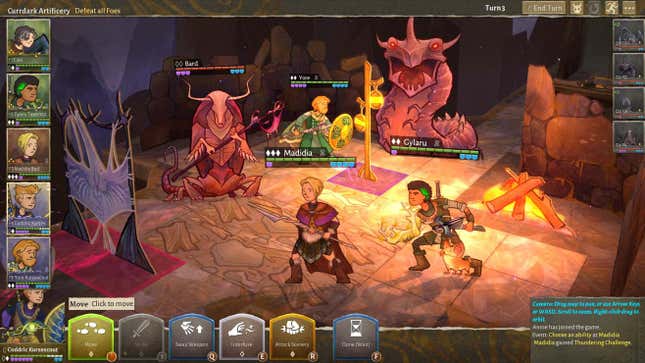
If someone wanted a quick and dirty explanation of Wildermyth, I’d tell them that it’s XCOM for fantasy nerds. The main difference is that it goes a lot harder on personal narratives for each of the individual characters than I would expect. See, Wildermyth is mostly procedurally generated. You can randomize your characters’ appearance, gender, sexuality, and background. Their personal arcs are defined by random life-altering events, but the writers have authored so much loving detail that I sometimes forget that my characters are determined by a cold and unfeeling dice roll.
These dice-roll people are real to me. That’s all that really matters, isn’t it?
Chicory: A Colorful Tale
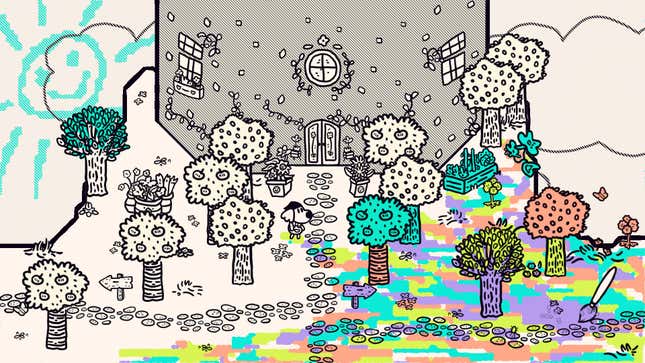
Here’s how most choices in video games are presented: kill the NPC or let them live? Tell someone a truth that will hurt them, or lie? Save the few or the many? In Chicory, there’s only one important choice: blue or orange? Dots or stripes? Bombastic colors, or the serenity of pure white? My character in Chicory was given a paintbrush and asked to paint every part of the game’s 2D levels.
Painting Chicory’s setting was a responsibility that allowed me to define the game world in a very tangible way, but my decisions carried none of the usual choice paralysis. Everything I did was inherently correct. Everything was permanent, until it wasn’t. Chicory deserves a spot on this list solely for allowing me to affect the environment in ways that were personally meaningful.
I want to save the world. I want to leave my mark on it. But I also don’t want to make a bunch of mistakes and fuck it all up. Chicory is the answer to all of those impulses. And it’s super satisfying too.
Opus: Echo of Starsong
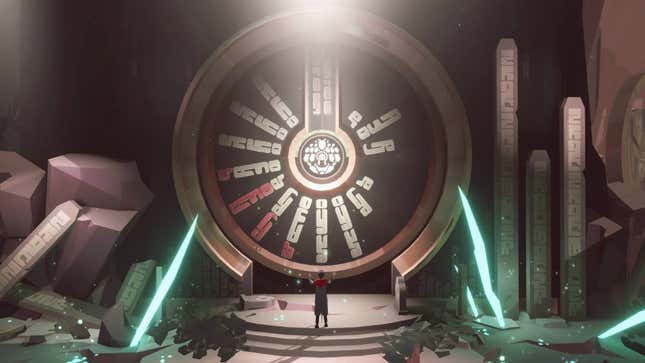
Starsong has the most impressive mood-setting and worldbuilding of any game that I played this year. Its galaxy feels both human and inhumane, intimate and distant. Starsong wraps violence in soft colors and a gentle soundtrack. But it never loses sight of the violent systems that have shaped every aspect of its characters, factions, and settings.
Genshin Impact
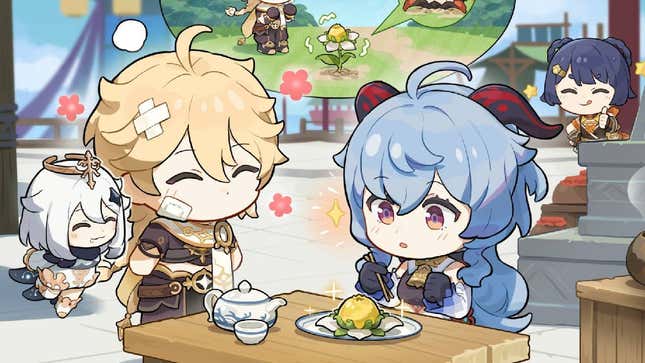
Raise your hand if you saw this coming. That’s right. The game that I plug at least 20 hours into every week has made my GOTY list, and for good reason. The updates have been reliably consistent, the new features genuinely improve my enjoyment of the game, and the fan content that comes out of this community is unparalleled. I’m always looking forward to every major Genshin patch, and I suspect that next year won’t be any different.
The Great Ace Attorney: Chronicles
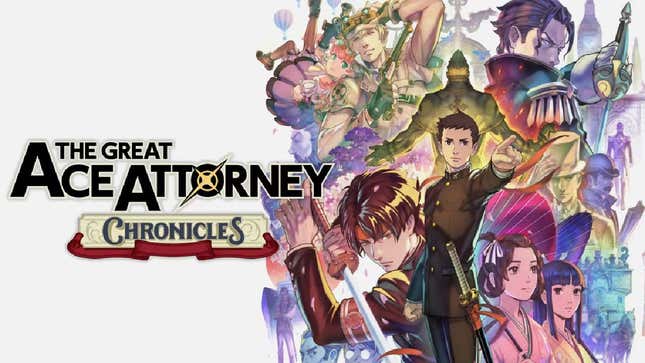
I’ve only finished three Ace Attorney games, and I never planned to go any further than that. But then a complete stranger practically begged me to play The Great Ace Attorney Chronicles. Sure, I thought. I could spare a few minutes here and there to solve some murders. I started playing this game five days ago, and I’ve been binging it nonstop every day since.
GAAC completely blew past my previous experiences with the series. While it’s filled with the usual quirky jokes and outlandish personalities, it also tells a surprisingly mature and nuanced story about class, gender, race, and empire. There’s still the old emphasis on solving puzzles and presenting evidence. After all, the British legal system is “modern” and “scientific.” Yet Chronicles is willing to sabotage its own gameplay to prove to the player that truth is inherently political. I wasn’t just piecing together the truth behind these grisly murders. The game invited me to challenge the superiority of the British Empire.
To say that Chronicles is an Ace Attorney game would be selling it woefully short. It’s an absolute must-play for anyone who’s interested in visual novels or detective fiction.

